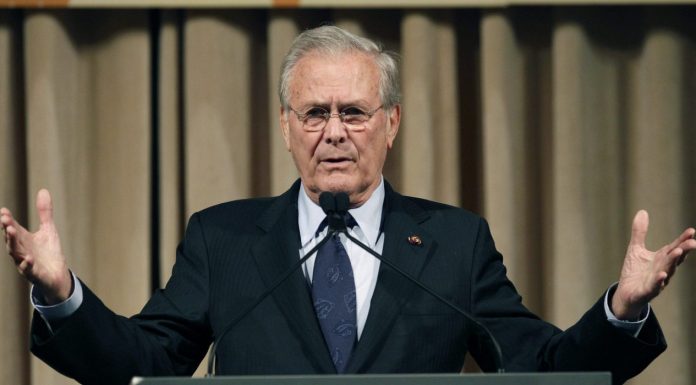(Headline USA) Donald Rumsfeld, the two-time defense secretary and one-time presidential candidate whose reputation as a skilled bureaucrat and visionary of a modern U.S. military was unraveled by the long and costly Iraq war, died Tuesday. He was 88.
In a statement Wednesday, Rumsfeld’s family said he “was surrounded by family in his beloved Taos, New Mexico.”
President George W. Bush, under whom Rumsfeld served as Pentagon chief, hailed his “steady service as a wartime secretary of defense—a duty he carried out with strength, skill, and honor.”
Regarded by former colleagues as equally smart and combative, patriotic and politically cunning, Rumsfeld had a storied career in government under four presidents and nearly a quarter century in corporate America.
After retiring in 2008 he headed the Rumsfeld Foundation to promote public service and to work with charities that provide services and support for military families and wounded veterans.
“Rummy,” as he was often called, was ambitious, witty, energetic, engaging and capable of great personal warmth.
An accomplished wrestler in college, Rumsfeld relished verbal sparring and elevated it to an art form; a biting humor was a favorite weapon.
Still, he built a network of loyalists who admired his work ethic, intelligence and impatience with all who failed to share his sense of urgency.
Rumsfeld is the only person to serve twice as Pentagon chief. The first time, in 1975-77, he was the youngest ever. The next time, in 2001-06, he was the oldest.
He made a brief run for the 1988 Republican presidential nomination, a spectacular flop that he once described as humbling for a man used to success at the highest levels of the government, including stints as White House chief of staff, U.S. ambassador and member of Congress.
For all Rumsfeld’s achievements, it was the setbacks in Iraq in the twilight of his career that will likely etch the most vivid features of his legacy.
Nine months into his second tour as defense secretary, on Sept. 11, 2001, suicide hijackers attacked the World Trade Center in New York and the Pentagon, thrusting the nation into wars for which the military was ill-prepared.
Rumsfeld oversaw the U.S. invasion of Afghanistan and toppling of the Taliban regime. Frequently presiding at televised briefings on the war, Rumsfeld became something of a TV star, applauded for his blunt talk and uncompromising style.
Among his enduring legacies was a famous line that helped to encapsulate the challenges of fighting terrorism.
“Reports that say that something hasn’t happened are always interesting to me, because as we know, there are known knowns; there are things we know we know,” Rumsfeld said in a Feb. 12, 2002 news briefing about the absence of weapons of mass destruction in Iraq.
“We also know there are known unknowns; that is to say we know there are some things we do not know,” Rumsfeld continued. “But there are also unknown unknowns—the ones we don’t know we don’t know. And if one looks throughout the history of our country and other free countries, it is the latter category that tends to be the difficult ones.”
By 2002 the Bush administration’s attention shifted to Iraq, which played no role in the Sept. 11 attacks. The war effort in Afghanistan took a back seat to Iraq, opening the way for the Taliban to make a comeback and prevent the U.S. from sealing the success of its initial invasion.
The U.S.-led invasion of Iraq was launched in March 2003. Baghdad fell quickly, but U.S. and allied forces soon became consumed with a violent insurgency. Critics faulted Rumsfeld for dismissing the pre-invasion assessment of the Army’s top general, Eric Shinseki, that several hundred thousand allied troops would be needed to stabilize Iraq.
Rumsfeld twice offered his resignation to Bush in 2004 amid disclosures that U.S. troops had abused detainees at Iraq’s Abu Ghraib prison—an episode he later referred to as his darkest hour as defense secretary.
Not until November 2006, after Democrats gained control of Congress by riding a wave of antiwar sentiment, did Bush finally decide Rumsfeld had to go. He left office in December, replaced by Robert Gates.
Rumsfeld is survived by his wife, Joyce, three children and seven grandchildren.
Adapted from reporting by the Associated Press

